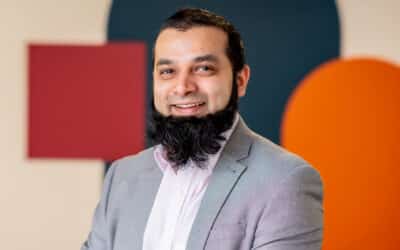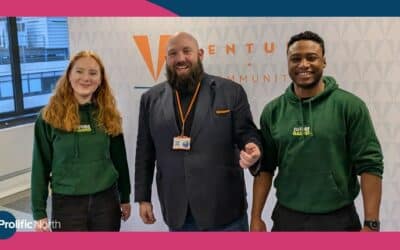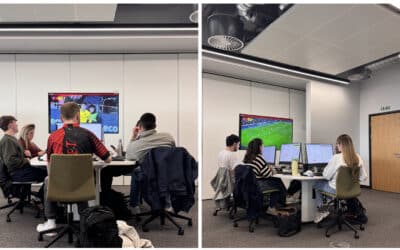Bradney Smith is a senior data scientist and joined Naimuri in January 2023. He primarily works on Natural Language Processing projects including with Large Language Models, such as those powering ChatGPT.
Naimuri is a software and data science company based in Salford Quays and is ‘committed’ to making the UK a safer place through technology.
Prior to working at Naimuri, Smith studied to become a mechanical engineer and worked as a physicist, before eventually finding data science.
Here, he shares his career journey, tips and insights.
How did you first get into your industry?
Like many data scientists, I didn’t take a straight-line path into the field. I studied Mechanical Engineering at university for five years, but after the first year I realised it wasn’t quite for me. Four years in, I took an industrial placement opportunity to work as a physicist, conducting large parameter studies on the high performance computers. Something about this really clicked with me, enough for me to finish my degree and return to the same company a year later (albeit in a different capacity).
I became more interested in the data analysis side, and using machine learning and AI to analyse my results. The more I learned, the more fascinated I became, and I set myself a goal to study Machine Learning concepts a little bit each night after work. Looking back, it’s crazy how much you can learn in a short amount of time if you are consistent. Self-study is by no means a requirement, but if you enjoy something it’s easier to stick to it – so find what you enjoy and pursue it!
What do you love about your job?
The best part of my job is by far the variety. As a data scientist, I of course spend a lot of time writing code and working with data, but I also spend a lot of time: talking with clients, travelling for customer presentations, taking part in internal projects for rapid innovation, being a personal manager, catching up with colleagues, and so much more. I definitely started my job for my interest in data science, but I continue to enjoy it for all the other aspects that come with it.
Who – or what – has inspired you in your career?
I think the answer most people give is their parents, but it’s definitely true. One of the biggest lessons I learnt from them was to have a good work ethic, and that being consistent at something will always net you better results in the end. This has probably carried me further than anything else in my career so I’m very grateful for that.
What are the biggest challenges about your job?
A key challenge can be explaining the AI solutions you are putting together to other people. A lot of models are seen as “black boxes” that take in some data and produce an output, but “we don’t really know what’s going on in the middle”. Of course we do know what’s going on, it’s just not easy to interpret or helpful to explain it a lot of the time. A big focus of mine as of late has been working with explainable AI methods that can produce traceable predictions with intuitive explanations. Communicating technical information to people outside of the AI space is a massively important skill that takes a good deal of practice to build up, but it’s worth it!
What skills have been the most crucial to you succeeding in your career so far?
A strong foundation in Python carries you so far in Data Science. A lot of new libraries and packages are released all the time – especially when working with state-of-the-art models. Having a solid understanding of the fundamentals allows you to quickly understand how newer packages work, and lets you pick up everything else you need as you go.
A good maths background is the other key ingredient for a successful data scientist. Machine Learning is built on three mathematical pillars; statistics, calculus, and linear algebra. If you have an appreciation for these three then you will be able to understand almost every aspect of data science on a deep level. Are they essential to get started? No. Are they essential to take your understanding to the next level? Absolutely.
What was your first salary and what could someone getting into the industry expect to earn nowadays?
My first salary was in a slightly different field, but at 21 I was paid £18,000 as a physicist working with Python. In data science, the salaries tend to be quite a bit higher, and so you could probably expect to start in the mid-high 20s to low 30s depending on skill set.
What education or training would be most useful for someone looking to follow your career path?
Data science is one of the few jobs that doesn’t necessarily require university degrees or set education paths. Having worked in internal recruitment, one of the things I love about this field is seeing people who have so much enthusiasm, and have picked up a lot of skills just by creating their own projects. If you are considering going to university and are unsure whether to take a Data Science degree, my advice would be to choose what you enjoy.
Most data scientists do not have data science degrees, but usually maths, physics, or engineering, and we’ve all managed just fine. Even if you have not been to university, the key skills you need remain the same: programming (any language will give the key concepts, but Python or R are preferable), and maths (but even this can be picked up along the way).
What advice would you have for someone looking to follow your path?
My thoughts boil down to two key points: do what you enjoy, and be consistent. If you enjoy writing code and solving interesting puzzles, you will probably enjoy Data Science. The more you enjoy it, the more you will stick with it. Setting a schedule to practice a little bit each day is one approach, or picking up skills while working on hobby projects is another great way to learn. The main thing is to find what works for you. If you struggle with the maths but enjoy the code, keep coding. The nice part about code libraries is that a lot of the maths is abstracted away and hidden from you anyway. You can piece together working components and slowly pick up the intricacies over time. No matter the stumbling block, keep at it and there’s no limit to how far you can go!













